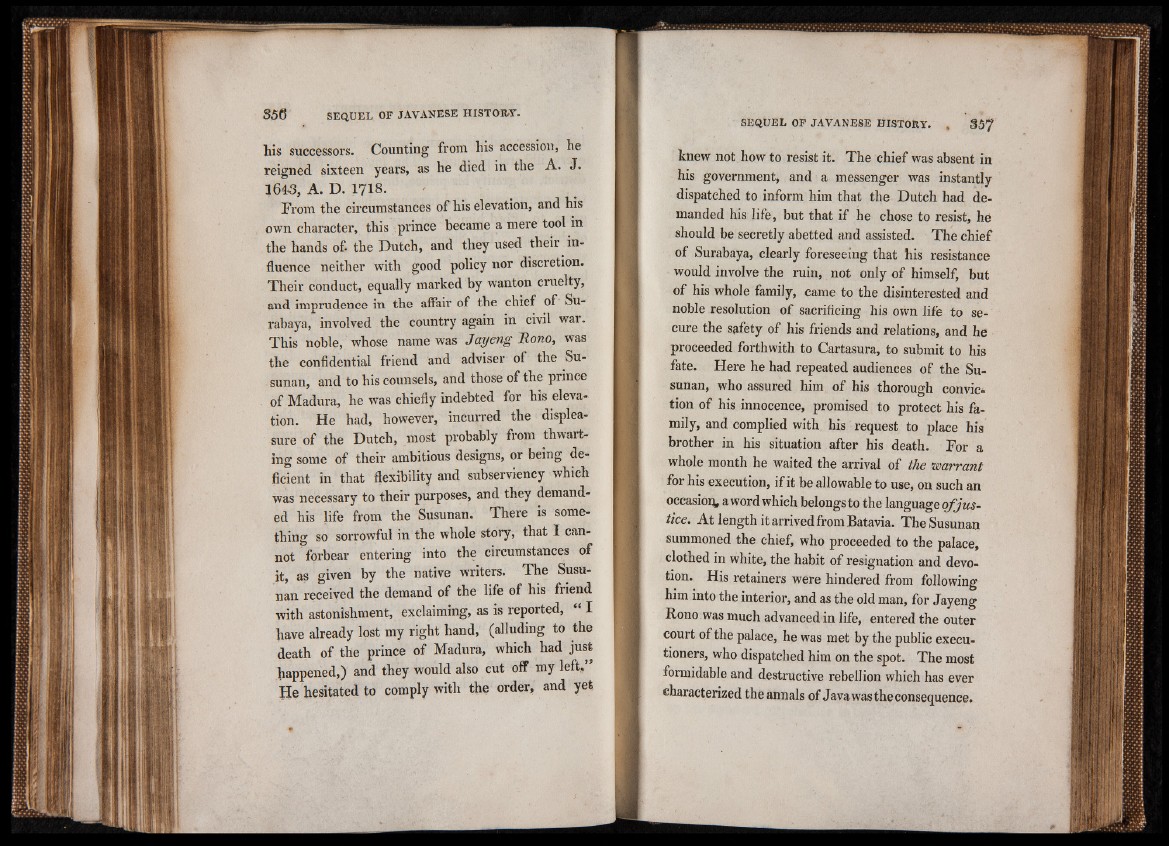
his successors. Counting from his accession, he
reigned sixteen years, as he died in the A. J.
1643, A. D. 1718. ' S ,
From the circumstances of his elevation, and his
own character, this prince became a mere tool in
the hands of the Dutch, and they used their influence
neither with good policy nor discretion.
Their conduct, equally marked by wanton cruelty,
and imprudence in the affair of the chief of Surabaya,
involved the country again in civil war.
This noble, whose name was Jay eng Rono, was
the confidential friend and adviser of the Su-
sunan, and to his counsels, and those of the prince
of Madura, he was chiefly indebted for his elevation.
He had, however, incurred the displeasure
of the Dutch, most probably from thwarting
some of their ambitious designs, or being deficient
in that flexibility and subserviency which
was necessary to their purposes, and they demanded
his life from the Susunan. There is something
so sorrowful in the whole story, that I cannot
forbear entering into the circumstances of
it, as given by the native writers. The Susunan
received the demand of the life of his friend
with astonishment, exclaiming, as is reported, “ I
have already lost my right hand, (alluding to the
death of the prince of Madura, which had just
happened,) and they would also cut off my KS§,”
He hesitated to comply with the order, and yet
knew not how to resist it. The chief was absent in
his government, and a messenger was instantly
dispatched to inform him that the Dutch had de-
manded his life, but that if he chose to resist, he
I should be secretly abetted and assisted. The chief
of Surabaya, clearly foreseeing that his resistance would involve the ruin, not only of himself, but
of his whole family, came to the disinterested and
noble resolution of sacrificing his own life to secure
the safety of his friends and relations, and he
proceeded forthwith to Cartasura, to submit to his
fate. Here he had repeated audiences of the Susunan,
who assured him of his thorough convict
tion of his innocence, promised to protect his family,
and complied with his request to place his
brother in his situation after his death. For a
whole month he waited the arrival of the •warrant
for his execution, if it be allowable to use, on such an
occasion a word which belongs to the language ofjus-
tice. At length it arrived from Batavia. The Susunan
summoned the chief, who proceeded to the palace,
clothed in white, the habit of resignation and devotion.
His retainers were hindered from following
him into the interior, and as the old man, for Jayeng
Rono was much advanced in life, entered the outer
court of the palace, he was met by the public executioners,
who dispatched him on the spot. The most
formidable and destructive rebellion which has ever
characterized the annals of Java was the consequence.